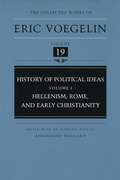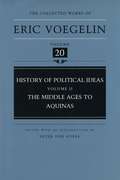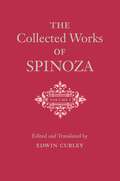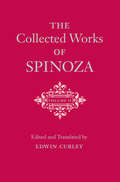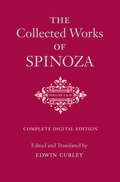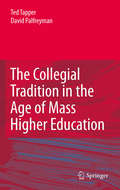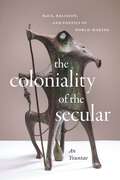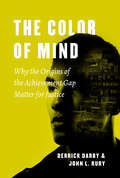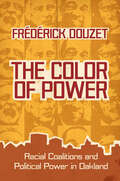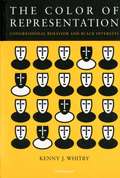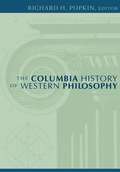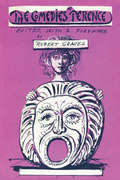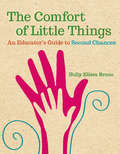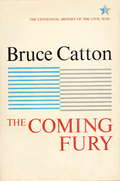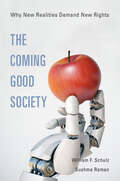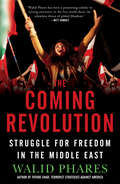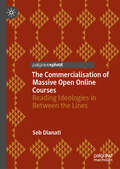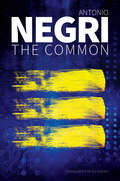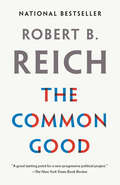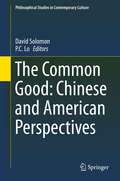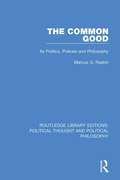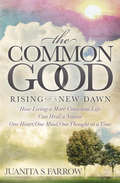- Table View
- List View
The Collected Works of Eric Voegelin Volume 19: Hellenism, Rome, and Early Christianity
by Eric Voegelin Athanasios MoulakisIn Hellenism, Rome, and Early Christianity, Voegelin demonstrates that the "spiritual disintegration" of the Hellenic world inaugurated a long process of transition in the self- understanding of Mediterranean and European man. The reflections that emerge remain universal concerns regarding the order of human existence in society and history. Although one may come to different conclusions, Voegelin's responses to the problems of the period suggest avenues of investigation that are still little traveled.
The Collected Works of Eric Voegelin Volume 20: The Middle Ages to Aquinas
by Peter Von Sivers Eric VoegelinHistory of Political Ideas contains both analyses of themes Voegelin developed in his later works and discussions of authors and ideas to which he did not return or which he later approached from a different angle and with a different emphasis. The Middle Ages to Aquinas has withstood the test of time. What makes it still highly valuable is its thoroughly revisionist approach, cutting through all the convenient cliches and generalizations and seeking to establish the experiential underpinnings that typified the medieval period.
The Collected Works of Spinoza, Volume I: One-volume Digital Edition
by Benedictus de SpinozaThe Collected Works of Spinoza provides, for the first time in English, a truly satisfactory edition of all of Spinoza's writings, with accurate and readable translations, based on the best critical editions of the original-language texts, done by a scholar who has published extensively on the philosopher's work.This first volume contains Spinoza's single most important work, the Ethics, and four earlier works: the Treatise on the Emendation of the Intellect, the Short Treatise on God, Man, and His Well-Being, Descartes' "Principles of Philosophy," and Metaphysical Thoughts. Also included are Spinoza's letters from the periods when these works were being written.The elaborate editorial apparatus—including prefaces, notes, glossary, and indexes—assists the reader in understanding one of the world's most fascinating, but also most difficult, philosophers. Of particular interest is the glossary-index, which provides extensive commentary on Spinoza's technical vocabulary.A milestone of scholarship more than forty-five years in the making, The Collected Works of Spinoza is an essential edition for anyone with a serious interest in Spinoza or the history of philosophy.
The Collected Works of Spinoza, Volume II: One-volume Digital Edition
by Benedictus de SpinozaThe second and final volume of the most authoritative English-language edition of Spinoza's writingsThe Collected Works of Spinoza provides, for the first time in English, a truly satisfactory edition of all of Spinoza's writings, with accurate and readable translations, based on the best critical editions of the original-language texts, done by a scholar who has published extensively on the philosopher's work.The centerpiece of this second volume is Spinoza’s Theological-Political Treatise, a landmark work in the history of biblical scholarship, the first argument for democracy by a major philosopher, and a forceful defense of freedom of thought and expression. This work is accompanied by Spinoza’s later correspondence, much of which responds to criticism of the Theological-Political Treatise. The volume also includes his last work, the unfinished Political Treatise, which builds on the foundations of the Theological-Political Treatise to offer plans for the organization of nontyrannical monarchies and aristocracies.The elaborate editorial apparatus—including prefaces, notes, glossary, and indexes—assists the reader in understanding one of the world’s most fascinating, but also most difficult, philosophers. Of particular interest is the glossary-index, which provides extensive commentary on Spinoza’s technical vocabulary.A milestone of scholarship more than forty-five years in the making, The Collected Works of Spinoza is an essential edition for anyone with a serious interest in Spinoza or the history of philosophy.
The Collected Works of Spinoza, Volumes I and II: One-Volume Digital Edition
by Benedictus de SpinozaThe Collected Works of Spinoza: Complete Digital Edition, combining volumes I and II, provides for the first time in English, a truly satisfactory edition of all of Spinoza's writings, with accurate and readable translations, based on the best critical editions of the original-language texts, done by a scholar who has published extensively on the philosopher’s work.The first volume contains Spinoza’s single most important work, the Ethics, and four earlier works: the Treatise on the Emendation of the Intellect, the Short Treatise on God, Man, and His Well-Being, Descartes’ "Principles of Philosophy," and Metaphysical Thoughts. Also included are Spinoza’s letters from the periods when these works were being written.The centerpiece of the second volume is Spinoza’s Theological-Political Treatise, a landmark work in the history of biblical scholarship, the first argument for democracy by a major philosopher, and a forceful defense of freedom of thought and expression. This work is accompanied by Spinoza’s later correspondence, much of which responds to criticism of the Theological-Political Treatise. The volume also includes his last work, the unfinished Political Treatise, which builds on the foundations of the Theological-Political Treatise to offer plans for the organization of nontyrannical monarchies and aristocracies.The elaborate editorial apparatus—including prefaces, notes, glossary, and indexes—assists the reader in understanding one of the world’s most fascinating, but also most difficult, philosophers. Of particular interest is the glossary-index, which provides extensive commentary on Spinoza’s technical vocabulary.A milestone of scholarship more than forty-five years in the making, The Collected Works of Spinoza is an essential edition for anyone with a serious interest in Spinoza or the history of philosophy.
The Collegial Tradition in the Age of Mass Higher Education
by David Palfreyman Ted TapperThis book will examine the relationship between collegiality and the collegial tradition in the context of the development of mass higher education. The collegial tradition in higher education has been shaped above all by the collegiate universities. In all its various forms (as commensality, as a mode of governance, and as a critical force in shaping the process of teaching, learning and research) the collegial tradition has found sustenance in many sectors of higher education. It may well be that the tradition as expressed in these forms now has more strength and depth in the non-collegiate than in the collegiate universities. This work will give a fuller picture of the present-day character of British (especially English) higher education. Although this is a book that will rely particularly upon the Oxford experience of collegiality, there will be extensive comparative and international reference to the idea of collegiality, the various challenges to it that have emerged within different national systems, and the contrasting patterns of adjustment to those challenges.
The Coloniality of the Secular: Race, Religion, and Poetics of World-Making
by Yountae AnIn The Coloniality of the Secular, An Yountae investigates the collusive ties between the modern concepts of the secular, religion, race, and coloniality in the Americas. Drawing on the work of Édouard Glissant, Frantz Fanon, Aimé Césaire, Sylvia Wynter, and Enrique Dussel, An maps the intersections of revolutionary non-Western thought with religious ideas to show how decoloniality redefines the sacred as an integral part of its liberation vision. He examines these thinkers’ rejection of colonial religions and interrogates the narrow conception of religion that confines it within colonial power structures. An explores decoloniality’s conception of the sacred in relation to revolutionary violence, gender, creolization, and racial phenomenology, demonstrating its potential for reshaping religious paradigms. Pointing out that the secular has been pivotal to regulating racial hierarchies under colonialism, he advocates for a broader understanding of religion that captures the fundamental ideas that drive decolonial thinking. By examining how decolonial theory incorporates the sacred into its vision of liberation, An invites readers to rethink the transformative power of decoloniality and religion to build a hopeful future.
The Color of Mind: Why the Origins of the Achievement Gap Matter for Justice (History and Philosophy of Education Series)
by Derrick Darby John L. Rury“An indispensable text for understanding educational racial injustice and contributing to initiatives to mitigate it.” —Educational TheoryAmerican students vary in educational achievement, but white students in general typically have better test scores and grades than black students. Why is this the case, and what can school leaders do about it? In The Color of Mind, Derrick Darby and John L. Rury answer these pressing questions and show that we cannot make further progress in closing the achievement gap until we understand its racist origins.Telling the story of what they call the Color of Mind—the idea that there are racial differences in intelligence, character, and behavior—they show how philosophers, such as David Hume and Immanuel Kant, and American statesman Thomas Jefferson, contributed to the construction of this pernicious idea, how it influenced the nature of schooling and student achievement, and how voices of dissent such as Frederick Douglass, Frances Ellen Watkins Harper, and W.E.B. Du Bois debunked the Color of Mind and worked to undo its adverse impacts.Rejecting the view that racial differences in educational achievement are a product of innate or cultural differences, Darby and Rury uncover the historical interplay between ideas about race and American schooling, to show clearly that the racial achievement gap has been socially and institutionally constructed. School leaders striving to bring justice and dignity to American schools today must work to root out the systemic manifestations of these ideas within schools, while still doing what they can to mitigate the negative effects of poverty, segregation, inequality, and other external factors that adversely affect student achievement. While we can’t expect schools alone to solve these vexing social problems, we must demand that they address the injustices associated with how we track, discipline, and deal with special education that reinforce long-standing racist ideas. That is the only way to expel the Color of Mind from schools, close the racial achievement gap, and afford all children the dignity they deserve.
The Color of Power: Racial Coalitions and Political Power in Oakland (Race, Ethnicity, and Politics)
by Frédérick DouzetThe Color of Power is a fascinating examination of the changing politics of race in Oakland, California. Oakland has been at the forefront of California’s multicultural changes for decades. Since the 1960s, the city has been a shining example of a fruitful liberal black-and-white political partnership and the successful incorporation of black politicians into the political landscape. But over the past forty years, the balance of power has changed as a consequence of dramatic demographic trends and economic circumstances. The city’s formerly dominant biracial political machine has been challenged by the demands of new multiracial interests.The city, once governed by a succession of black mayors and majority black city councils, must now accommodate rapidly growing Asian and Latino communities. While the black-led coalition still relies on white progressive support, this alliance has weakened due to a shift in the progressives’ agenda and the voting habits of the black community, the rise of a Hispanic-Asian coalition, and a strong demographic decline of the African American population. With similar demographic changes taking place across the nation, Oakland’s experience provides insight in to the multiracial future of other American cities.The Color of Power investigates Oakland’s contemporary racial politics with a detailed study of conflicts over issues like education, elections and political representation, and crime. Trained as a journalist, a political scientist, and a geographer, the author provides a unique perspective supported by numerous maps and extensive interviews.Winner of awards from the French Society of Geography and the French National Academy of Sciences
The Color of Representation
by Kenny J. WhitbyThe central domestic issue in the United States over the long history of this nation has been the place of the people of color in American society. One aspect of this debate is how African-Americans are represented in Congress. Kenny J. Whitby examines congressional responsiveness to black interests by focusing on the representational link between African-American constituents and the policymaking behavior of members of the United States House of Representatives. The book uses the topics of voting rights, civil rights, and race- based redistricting to examine how members of Congress respond to the interests of black voters. Whitby's analysis weighs the relative effect of district characteristics such as partisanship, regional location, degree of urbanization and the size of the black constituency on the voting behavior of House members over time. Whitby explores how black interests are represented in formal, descriptive, symbolic, and substantive terms. He shows the political tradeoffs involved in redistricting to increase the number of African-Americans in Congress. The book is the most comprehensive analysis of black politics in the congressional context ever published. It will appeal to political scientists, sociologists, historians, and psychologists concerned with minority politics, legislative politics, and the psychological, political, and sociological effects of increasing minority membership in Congress on the perception of government held by African Americans.
The Columbia Guide to American Environmental History
by Carolyn MerchantMerchant provides a context-setting overview of American environmental history from the beginning of the millennium; an encyclopedia of important concepts, people, agencies, and laws; a chronology of major events; and an extensive bibliography including films, videos, CD-ROMs, and websites.
The Columbia History of Western Philosophy
by Ed. Popkin Richard H.Richard Popkin has assembled 63 leading scholars to forge a highly approachable chronological account of the development of Western philosophical traditions. From Plato to Wittgenstein and from Aquinas to Heidegger, this volume provides lively, in-depth, and up-to-date historical analysis of all the key figures, schools, and movements of Western philosophy.The Columbia History significantly broadens the scope of Western philosophy to reveal the influence of Middle Eastern and Asian thought, the vital contributions of Jewish and Islamic philosophers, and the role of women within the tradition. Along with a wealth of new scholarship, recently discovered works in 17th- and 18th-century philosophy are considered, such as previously unpublished works by Locke that inspire a new assessment of the evolution of his ideas. Popkin also emphasizes schools and developments that have traditionally been overlooked. Sections on Aristotle and Plato are followed by a detailed presentation on Hellenic philosophy and its influence on the modern developments of materialism and scepticism. A chapter has been dedicated to Jewish and Moslem philosophical development during the Middle Ages, focusing on the critical role of figures such as Averroës and Moses Maimonides in introducing Christian thinkers to classical philosophy. Another chapter considers Renaissance philosophy and its seminal influence on the development of modern humanism and science.Turning to the modern era, contributors consider the importance of the Kaballah to Spinoza, Leibniz, and Newton and the influence of popular philosophers like Moses Mendelssohn upon the work of Kant. This volume gives equal attention to both sides of the current rift in philosophy between continental and analytic schools, charting the development of each right up to the end of the 20th century.Each chapter includes an introductory essay, and Popkin provides notes that draw connections among the separate articles. The rich bibliographic information and the indexes of names and terms make the volume a valuable resource.Combining a broad scope and penetrating analysis with a keen sense of what is relevant for the modern reader, The Columbia History of Western Philosophy will prove an accessible introduction for students and an informative overview for general readers.
The Columbia History of Western Philosophy
by Richard H. PopkinRichard Popkin has assembled sixty-three leading scholars to forge a highly approachable chronological account of the development of Western philosophical traditions. From Plato to Wittgenstein and from Aquinas to Heidegger, this volume provides lively, in-depth, and up-to-date historical analysis of all the key figures, schools, and movements of Western philosophy. Each chapter includes an introductory essay, and Popkin provides notes that draw connections among the separate articles. The rich bibliographic information the and the indexes of names and terms make the volume a valuable resource.
The Comedies of Terence
by Robert GravesTerence achieved in his brief twenty-six years a standard of stylistic perfection and artistic restraint that ranked him, along with Plautus, as the greatest of the Roman comic playwrights. He was, at the very least, a gifted translator and adaptor, having used Greek New Comedies as the basis for all six of his extant plays. How far his own contribution exceeded that of simple translation is difficult to say, but we know that the Latin, undeniably his, was so faultlessly styled that his work served as a textbook for scholars and grammarians for hundreds of years.Terence had a considerable impact on the Revival of Letters; his comedies were studied and were frequently adapted into new works by such men as Steele, Chapman, and, most famously, Moliire. Indeed, had there been no Terence, it is doubtful that the Comedy of Manners could have arisen when it did, and all comic writing for the stage, from Moilire through the Restoration drama to the present day, would be diminished for lack of him. Appropriately, the language of this translation is from the Restoration. Graves has based his version on the one made in 1689 by Laurence Echard; he has corrected inaccuracies, eliminated defects and obscurities, but retained the period tone.Including in this book are the major comedies: The Fair Andrian, The Mother-In-Law, The Self-Tormentor, The Eunuch, The Tricks of Phormio and The Brothers. A close reading of Terence is a fine corrective to any idea that may still be current, about the glory that was Greece and grandeur that was Rome during the Hellenistic period. It is an assurance that in some respects at least, this age is not depraved at all.
The Comfort of Little Things
by Holly Elissa BrunoThe Comfort of Little Things is a thought-provoking book that empowers educators to give themselves and the people in their lives second chances in order for themselves and the children they teach to learn and thrive. This book includes stories from the author and contributors to the author's blog posts.Holly Elissa Bruno is an author, attorney, acclaimed keynote speaker, and host of an online radio program. Her other Redleaf Press books are Managing Legal Risks in Early Childhood Programs (co-published with Teachers College Press) and Learning from the Bumps in the Road.
The Comic Self: Toward Dispossession (Thinking Theory)
by Grant Farred Timothy C. CampbellA provocative and unconventional call to dispossess the self of itself Challenging the contemporary notion of &“self-care&” and the Western mania for &“self-possession,&” The Comic Self deploys philosophical discourse and literary expression to propose an alternate and less toxic model for human aspiration: a comic self. Timothy Campbell and Grant Farred argue that the problem with the &“care of the self,&” from Foucault onward, is that it reinforces identity, strengthening the relation between I and mine. This assertion of self-possession raises a question vital for understanding how we are to live with each other and ourselves: How can you care for something that is truly not yours?The answer lies in the unrepresentable comic self. Campbell and Farred range across philosophy, literature, and contemporary comedy—engaging with Socrates, Burke, Hume, Hegel, Marx, Nietzsche, Heidegger, Derrida, Deleuze, and Levinas; Shakespeare, Cervantes, Woolf, Kafka, and Pasolini; and Stephen Colbert, David Chappelle, and the cast of Saturday Night Live. They uncover spaces where the dispossession of self and, with it, the dismantling of the regime of self-care are possible. Arguing that the comic self always keeps a precarious closeness to the tragic self, while opposing the machinations of capital endemic to the logic of self-possession, they provide a powerful and provocative antidote to the tragic self that so dominates the tenor of our times.
The Coming Fury (The American Civil War Trilogy #1)
by Bruce CattonWinner of the Pulitzer Prize and the National Book Award! A thrilling, page-turning piece of writing that describes the forces conspiring to tear apart the United States--with the disintegrating political processes and rising tempers finally erupting at Bull Run. " . . . a major work by a major writer, a superb recreation of the twelve crucial months that opened the Civil War." --The New York Times
The Coming Good Society: Why New Realities Demand New Rights
by William F. Schulz Sushma Ramen&“Challenge[s] all of us to think deeply about what kind of society we and our children and our children&’s children will want to live in.&” (Margaret L. Huang, former Executive Director, Amnesty International USA) A rights revolution is under way. Today the range of nonhuman entities thought to deserve rights is exploding. Changes in norms and circumstances require the expansion of rights: What new rights, for example, are needed if we understand gender to be nonbinary? Does living in a corrupt state violate our rights? When biotechnology is used to change genetic code, whose rights might be violated? What rights, if any, protect our privacy from the intrusions of sophisticated surveillance techniques? Drawing on their vast experience as human rights advocates, William Schulz and Sushma Raman challenge us to think hard about how rights evolve with changing circumstances, and what rights will look like ten, twenty, or fifty years from now. The Coming Good Society details the many frontiers of rights today and the debates surrounding them. Schulz and Raman equip us with the tools to engage the present and future of rights so that we understand their importance and know where we stand. &“Thoughtful and provocative.&” —Human Rights Quarterly &“[A] trail-blazing map through the new frontiers of rights . . . downright riveting.&” —Gloucester Times &“An accessible primer for anyone who wishes to understand the current limitations in our notions of rights and the future challenges for which we must prepare.&” —Kerry Kennedy, President, Robert F. Kennedy Human Rights &“Schulz and Raman outline brilliantly where [human rights] growth may take rights in the generations to come.&” ―Zeid Ra&’ad al-Hussein, former United Nations High Commissioner for Human Rights
The Coming Revolution
by PharesAfter the 9/11 Commission concluded in 2004 that the U.S. was engaged in a war with terrorists and never realized it, they reasoned that "a failure of imagination" had prevented us from seeing terrorism coming. In effect, Americans were simply unable, or in fact disabled, to fathom that there were people who hated and opposed our democracy with such ferocity. But after billions of dollars and almost a decade fighting a war in the Middle East, will we miss the threat again? With penetrating insight and candor, Walid Phares, Fox News terrorism and Middle East expert and a specialist in global strategies, argues that a fierce race for control of the Middle East is on, and the world's future may depend on the outcome. Yet not a failure of imagination, but rather, of education has left Americans without essential information on the real roots of the rising Jihadi threat. Western democracies display a dangerous misunderstanding of precisely who opposes democracy and why. In fact, the West ignores the wide and disparate forces within the Muslim world--including a brotherhood against democracy that is fighting to bring the region under totalitarian control--and crucially underestimates the determined generation of youth feverishly waging a grassroots revolution toward democracy and human rights. As terror strikes widen from Manhattan to Mumbai and battlefields rage from Afghanistan to Iraq, many tough questions are left unanswered, or even explored: Where are the anti-Jihadists and the democrats in the Muslim world? Does the Middle East really reject democracy? Do the peoples of the region prefer the Taliban, the Muslim Brotherhood, or Hezbollah over liberals and seculars? And is there really no genuine hope that freedom and democracy can prevail over the Islamist caliphate? Phares explores how the free world can indeed win the conflict with the Jihadists, but he says, not by using the tactics, policies, and strategies it has employed so far. He urges policy makers to first identify the threat and define its ideology, or there will be no victory. The Coming Revolution is a vital corrective step in the world's war against terrorism and essential reading that clearly and explosively illustrates the untold story of a struggle to determine if the Middle East can at last reach freedom in this century--or if this planet can prevent the otherwise inevitable outcome that could change our social and political landscape forever. The race is on.
The Commercialisation of Massive Open Online Courses: Reading Ideologies in Between the Lines
by Seb DianatiThis book critically examines the role of Massive Open Online Courses (MOOCs) in higher education, against the backdrop of rapid developments in online learning. Reporting on a method by which one could isolate ideologically charged words from websites, the author underlines the need to pause, question and understand the underlying motives behind MOOCs, and ask fundamental questions about their data use, commercial interests, and ability to provide ‘good’ education. With its step-by-step ideological analysis, the author challenges educators, policymakers, and students alike to reconsider the fabric of online courses and their associated platforms. The book will appeal to scholars of digital education and sociology, as well as scholars from the critical sciences.
The Common
by Antonio NegriThis final volume in Antonio Negri’s new trilogy aims to clarify and develop the ‘common’ as a key concept of radical thought. Here the term is understood in a double sense: on the one hand, as a collective of production and consumption in which the domination of capital has been completely realized; on the other hand, as the cooperation of workers and citizens and their assertion of political power. The maturation of this duality was the sign of the limits of capitalism in our age; the common showed itself as the active force that recomposed production, society and life in a new experience of freedom. Today the promise of freedom seems undermined by the very institutions founded to uphold it, as the charters of western democracy seek to prioritize individualism. Negri advocates instead a free society founded on the premise that the good life is to be collectively ordered – in other words, a society that elevates the common. In his vision, giving political expression to those who work and produce is the only way of overturning totalitarian exploitation and of enabling every citizen to participate in the development of the city. Like its companion volumes, this new collection of essays by Negri will be a valuable resource for anyone interested in radical politics and in the key social and political struggles of our time.
The Common Good
by Robert B. ReichFrom the best-selling author of Saving Capitalism and The Work of Nations, a passionate, clear-eyed manifesto on why we must restore the idea of the common good to the center of our economics and politics.With the warmth and lucidity that have made him one of our most important public voices, Robert B. Reich makes the case for a generous, inclusive understanding of the American project, centering on the moral obligations of citizenship. Rooting his argument in everyday reality and common sense, Reich demonstrates the existence of a common good, and argues that it is this that defines a society or a nation. Societies and nations undergo virtuous cycles that reinforce and build the common good, as well as vicious cycles that undermine it. Over the course of the past five decades, Reich contends, America has been in a slowly accelerating vicious cycle--one that can and must be reversed. But first we need to weigh what really matters, and how we as a country should relate to honor, shame, patriotism, truth, and the meaning of leadership.Powerful, urgent, and utterly vital, this is a heartfelt missive from one of our foremost political thinkers: a fundamental statement about the purpose of society and a cri de coeur to save America's soul.
The Common Good: Chinese and American Perspectives
by David Solomon P. C. LoThis book addresses the Confucian philosophy of common good and deals with the comparative philosophy on eastern and western understandings of common good. The common good is an essentially contested concept in contemporary moral and political discussions. Although the notion of the common good has a slightly antique air, especially in the North Atlantic discussion, it has figured prominently in both the sophisticated theoretical accounts of moral and political theory in recent years and also in the popular arguments brought for particular political policies and for more general orientations toward policy. It has been at home both in the political arsenal of the left and the right and has had special significance in ethical and political debates in modern and modernizing cultures. This text will be of interest to philosophers interested in Chinese philosophy and issues related to individualism and communitarianism, ethicists and political philosophers, comparative philosophers, and those in religious studies working on Chinese religion.
The Common Good: Its Politics, Policies and Philosophy (Routledge Library Editions: Political Thought and Political Philosophy #49)
by Marcus G. RaskinFirst published in 1986. In this thought-provoking book the widely acclaimed thinker and activist, Marcus Raskin, moves beyond the limits and failures of socialism and capitalism to an original theory of social reconstruction for a humane society. Presenting concrete alternatives for education, health, economics and national security he develops a new conception of democracy and the rule of law in relation to our common good. A political and philosophic tool designed for those who search for alternatives in their lives and in the world, The Common Good shows how to organize for social reconstruction, the type of leadership now required, and the importance of restoring progress as a political purpose. Defining politics as broader than the mere manifestation of power, Raskin’s vision helps the left and liberals find their way towards a new public philosophy and program.
The Common Good: Rising of a New Dawn: How Living a More Conscious Life Can Heal a Nation One Heart, One Mind, One Thought at a Time
by Juanita S. FarrowAn inspiring guide about how our daily decisions can turn hate and fear into hope and love. The Common Good: Rising of a New Dawn will forever change how you see your neighbor. On this captivating spiritual journey through America, hear the stories of how ordinary people—people in the trenches devoted to the common good—are making an extraordinary difference in the lives of many. With passion, wit, and wisdom, Juanita Farrow discusses business, politics, and religion, and paints a compelling picture of how the common good is God&’s desire for America, and why it&’s good for America. Juanita Farrow states, &“We live in a great country, but far too often we allow our beliefs and egos to divide us in ways that become a form of paralysis that impacts the entire nation.&” Explore how the people in our lives and the experiences of our journey begin to shape our decisions and our view of the world. The Common Good speaks to people of faith and nonbelievers, and challenges everyone to look within for authentic purpose. It looks at pressing issues for Americans, but also the rising of a new dawn. Building the bridges to transcend differences will require a lot of heart. Creating a movement for the common good will be difficult, but even businesses, for instance, have found social entrepreneurship not only solves problems around the world, but is good for the bottom line. The Common Good describes how living a more conscious life can heal a nation—one heart, one mind, one thought at a time. A message of hope on how to turn fear into love, it can leave you feeling truly empowered—and inspired to make a difference.
